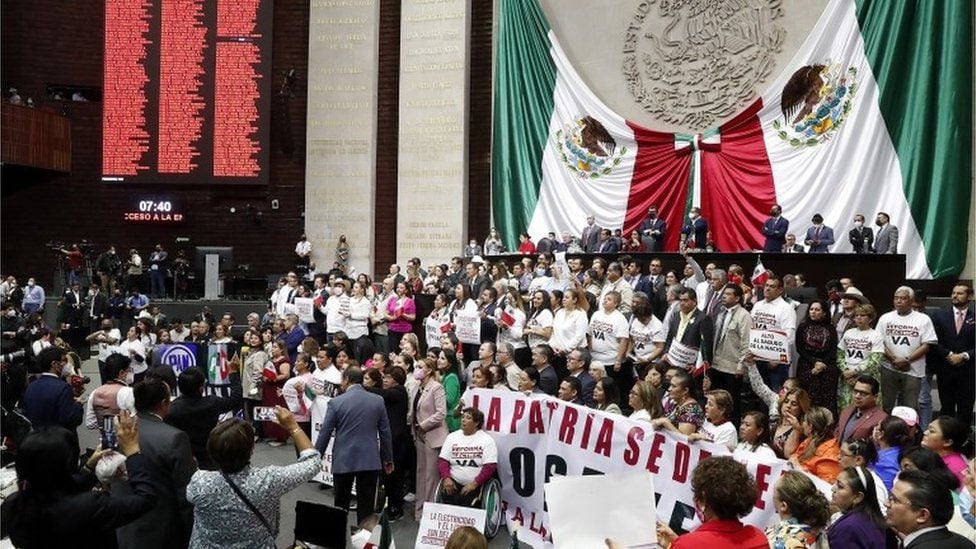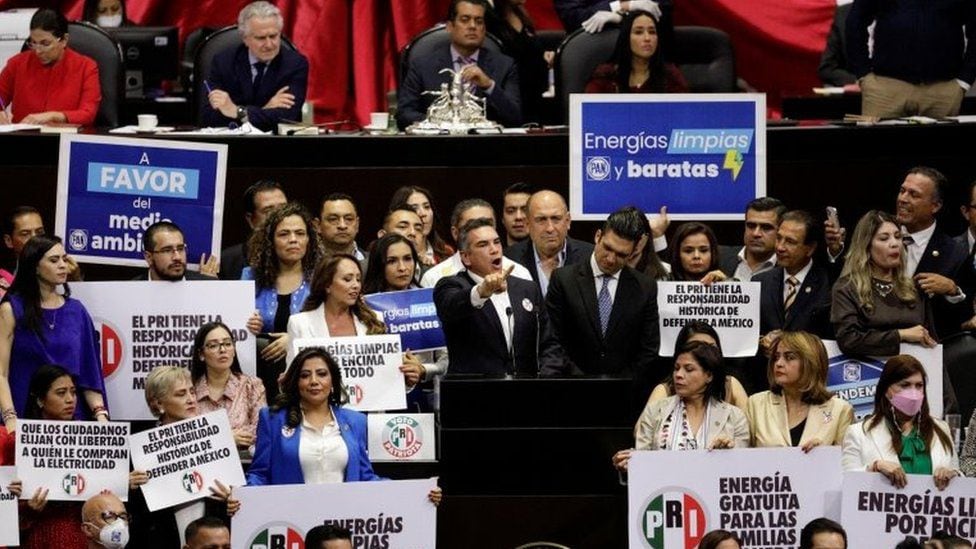Andres Manuel Lopez Obrador (AMLO) he had his first major legislative setback since he became president.
For the first time since the Mexican government took office in 2018, a proposal to reform the Constitution of the president did not obtain the necessary majority in Congress to be approved.
LOOK: “The battle for Donbas will be long and bloody, more similar to World War II than to what happened in kyiv”
The president promoted a controversial reform of the electricity industry that sought return the domain in the sector to Federal Electricity Commission (CFE)the state company.
Despite the fact that his proposal obtained 275 votes in favor of the ruling bloc in the Chamber of Deputies, did not reach the qualified majority of 332 votes of the legislators present in the session and that is required to modify the Constitution.
The alliance of opposition parties celebrated at midnight on Sunday for having stopped a proposal that considered regressive for the electrical industry and the environment
For the president, on the contrary, it was a vote that favors national and foreign private companies that generate and sell electricity in a huge market that serves almost 130 million people.
“Yesterday an act of betrayal of Mexico was committed by a group of legislators, who instead of defending the interests of the people, of the nation, instead of defending what is public, became outspoken defenders of foreign companies. who are dedicated to thriving, to stealing,” AMLO said in his morning press conference this Monday.
“These deputies backed the looters, to put it bluntly,” he added.
The lack of votes for the approval of his proposal was already foreseeable since last week.
Faced with this scenario, the president sent the same Sunday a bill -which only requires a simple majority in both chambers– to define the exclusive property for the state of lithium.
a controversial topic
AMLO’s proposal had as its main objective to return to the CFE the domain (54%) in the generation and sale of electricity in the country that today it controls the private initiative in more than 60%.
The government argued that, since the 2013 energy reform, the CFE was wasting its generating capacity by being underutilized due to limitations of the law, which translates into losses for the treasury and profits for private generators.

But opposition lawmakers argued that it was an attempt to create a state monopoly in the sector, that the CFE operates with obsolete and polluting plants, and that all this translates into a damage to the environment and investments in clean energy.
“We are going to vote against this reform because it harms Mexico. There was no specialist, academic, activist, or environmentalist who left room for doubt,” said deputy Jorge Álvarez, from the Movimiento Ciudadano party, in a session that lasted about 12 hours.
For the opposition National Action Party, the second bloc with the most deputies, Jorge Romero emphasized that they voted against the “hyper-empowerment” of the CFE, since they consider that competition from the public and private sectors is necessary for lower electricity rates.

The accusation of “treason against the fatherland” was the flag of the ruling bloc, which led several displays of banners and slogans during Sunday’s session.
“With this reform, electric power would stop being a simple commodity and become a public service for Mexicans,” said Ignacio Mier, leader of the government’s Morena party.
Lithium under discussion
Among the proposals of the electrical reform that were rejected was also writing in the Constitution that lithium -a key mineral for the manufacture of batteries of all kinds- was used exclusively by the State.
Currently only about five companies have lithium exploitation concessions, several of them with Chinese capital. The ore is concentrated in the desert region of northwestern Mexico.

Despite the fact that the constitutional proposal was rejected, AMLO announced last week a “shield” to lithium through a reform to the mining law that only requires a simple majority in Congress to be approved.
“We already saw this coming… We reserve the possibility of including lithium in the mining law,” warned the president when explaining his initiative that will be discussed this Monday in Congress.
“It arouses ambition in the great powers, because it is a strategic ore for future development to displace oil. So they covet lithium more than anything,” AMLO said.
“Today it will be discussed in the Chamber [de Diputados] so that we nationalize lithium, of course. May it only be used for the benefit of national development.”
With the vote of 251 deputies and 65 senators, which the government has assured, the reform would be approved.
Source: Elcomercio

:quality(75)/cloudfront-us-east-1.images.arcpublishing.com/elcomercio/GI4TCNZNGA2C2MJYKQYDAORSHE.jpg)

:quality(75)/cloudfront-us-east-1.images.arcpublishing.com/elcomercio/GQZDCNJNGA2C2MJSKQ2TMORUGI.jpg)
:quality(75)/cloudfront-us-east-1.images.arcpublishing.com/elcomercio/WWQBJVUCIVALRFYLG3BIAVWQ6I.jpg)
:quality(75)/cloudfront-us-east-1.images.arcpublishing.com/elcomercio/6T5VR63ZIVHVHIZXGIZCSUVBCM.jpg)

